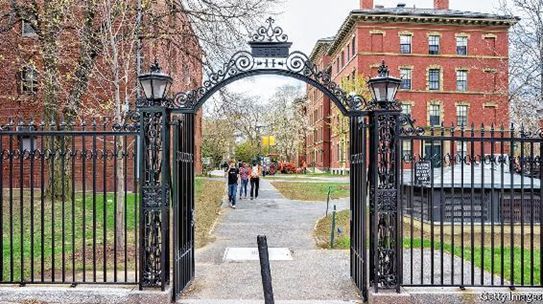Why more British students are choosing foreign universities
The number going to study in America has risen by a third since 2010
Feb 15th 2018
AFTER a talk on attending university in America, Mazen, a pupil in his penultimate year at King Solomon Academy, a state school in central London, considers his options. The idea of studying overseas is “daunting”. But his interests embrace everything from African history to biology to music, and he likes the breadth of courses on offer at American universities. He thinks he will take the plunge. “Nothing in life comes without risk,” he concludes.
Few British students share his outlook.Among big Western countries, Britain has one of the lowest rates of students studying overseas. This caution is produced by a mixture of parochialism (few pupils master a foreign language at school) and superiority (universities at home are excellent).
But there are signs that Mazen’s attitude is becoming more common. Although there are no official statistics, data from international higher education authorities show that most destinations have seen a big increase in the number of British students in recent years. Of seven countries surveyed by The Economist, America, Canada, France, Germany and the Netherlands have all seen growth since 2010. Only Australia and Ireland have not.
penultimate: occurring immediately before the last one: next to the last
parochial: limited to only the things that affect your local area
parochialism
英国的学生出国留学的比例很少,一是因为地方主义,学生很少学第二语言;二是本国的大学很好,没必要留学。 但现在这个现象也在改变了,越来越多的学生考虑出国读书
America exerts the greatest pull. It lured 11,489 British students in 2016-17, some 30% more than in 2009-10. Ivy League institutions now recruit heavily from Britain’s private schools, whose pupils can stomach their exorbitant fees and have the excellent grades required for entry. St Paul’s, a grand, academically selective school in west London, sent 31 pupils overseas in 2016, almost all to America, up from 11 in 2011. A decade or so ago pupils would rarely turn down Oxbridge, says Alex Wilson, an official at the school. Now, in order to go abroad, two or three do so every year.
Pupils are increasingly likely to hire agencies to help with the exams, essays, interviews and CV development required by American universities, says Will Orr-Ewing of Keystone Tutors, a London-based firm. Whereas British universities are most keen to get a sense of an applicant’s academic ability, American ones “really want to explore who you are”, says one consultant. Coaching can help candidates work that out.
exorbitant: going far beyond what is fair, reasonable, or expected: too high, expensive, etc.
十年前,很少有人拒绝牛津大学的offer, 但是现在每年都有2到3个会拒绝牛津的offer去国外留学。在申请阶段,英国的大学比较看重学生的学术能力,而美国的大学就是真的想“全方面了解你这个人”...
There has also been a rise in the number going to America from poorer families. The Sutton Trust, a British education charity, runs a summer school programme at MIT and Yale for bright pupils from less well-off backgrounds. Since it was launched in 2012, 267 students have gone on to an American university, often taking advantage of generous scholarships. Indeed, the top American universities send representatives to Britain to spread word that, depending on family circumstances, their fees are not always as steep as the “sticker price” would imply.
Their efforts are helped by rising tuition fees in England and Wales, which have made foreign universities look like better value. In 2012 fees nearly trebled, to £9,000 ($14,000) a year. By contrast, students who go to Germany study free of charge. In the Netherlands, many have access to state benefits. (British students probably won’t qualify for these discounts after Brexit.) Even American universities can seem reasonable by comparison.
英国本国的大学学费越来越贵,2012年学费涨了将近3倍,每年9000英镑,而去德国留学时不用学费的,荷兰有国家补贴(英国脱欧后不享受该政策),甚至美国的大学都比英国的收费合理
Growing numbers of English-language courses have helped to entice monoglot Britons abroad. In the Netherlands, the number of English bachelor’s courses has risen from 188 in 2011 to 426 today, according to A-Star Future, a firm which promotes foreign universities to pupils in Britain. In the same period, the number of Britons studying in the Netherlands rose from 910 to 2,778. Some elite universities in France and Italy, including the École Polytechnique and Bocconi University, now offer courses in English.
Universities have also benefited from rising international mobility. In 2007, 4.4% of British residents younger than15 were born overseas; today 5.4% are. Since 1987 more than 200,000 British students have spent some time working or studying abroad under the Erasmus scheme, a European student-exchange programme (which may also be off-limits after Brexit). Many will have returned with happy memories, selling the idea of foreign study to their siblings or offspring. Meanwhile, technology shrinks both distance and parental concern. At the talk attended by Mazen, a speaker from A-list, another consultancy, reassures parents of the potential for long-distance mollycoddling: “You can order Uber, you can have groceries delivered, you can keep tabs on them.”
mollycoddle: to treat someone with more kindness and attention than is appropriate: to treat someone too nicely or gently
The number of young Britons studying abroad might be higher still were it not for bureaucratic constraints. David Willetts, a former universities minister, has bemoaned the fact that British students are not allowed to take their generous financial support abroad, as Norwegian students can. Although UCAS, the portal through which British students apply to university, opened to EU institutions in 2015, if a university joins it is strongly encouraged to use UCAS for all its student admissions. So far just one (the Amsterdam Fashion Academy) has signed up.
That is a shame. It allows British universities to escape a source of competitive pressure. And, more important, by making it more difficult to study abroad it stifles students’ potential.Badr, another attendee at the presentation on studying abroad, says he wants to work for Google before starting his own business. He reckons that studying in America would be a good place to start. It is hard to disagree.
stifle: to not allow yourself to do or express something
总结:留学是一段艰辛的路,但这条路会越走越宽,让您的眼界更宽广
我在新西兰留学一年,学费10万人民币左右,生活费不够了就出去打工赚,这几年的经历都让我终身受益!
--------------------------------------------------------------------------------------------------------------------
Results
Lexile®Measure: 1100L - 1200L
Mean Sentence Length: 16.21
Mean Log Word Frequency: 3.18
Word Count: 859
这篇文章的蓝思值是在1100-1200L, 适合英语专业大二大三的水平学习,是经济学人里一般难度!
使用kindle断断续续地读《经济学人》三年,发现从一开始磕磕碰碰到现在比较顺畅地读完,进步很大,推荐购买!点击这里可以去亚马逊官网购买~
